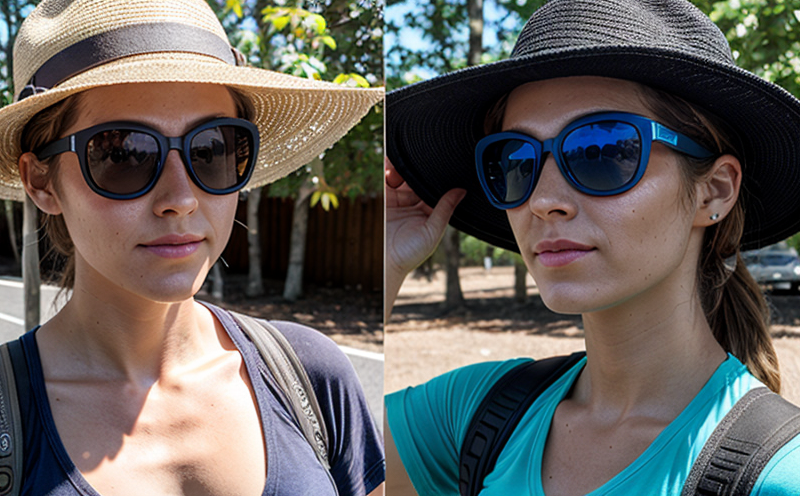Protective tent fabrics sunlight resistance testing
The sun’s ultraviolet (UV) rays can be a significant threat to the integrity and longevity of protective tent fabrics. UV protection is crucial in ensuring that these materials maintain their performance over time, especially when exposed to prolonged outdoor conditions.
In this context, sunlight resistance testing evaluates how well the fabric withstands UV radiation without degrading. This process helps manufacturers ensure durability and reliability, thereby enhancing customer satisfaction and trust in the product’s quality. The testing also plays a vital role in compliance with international standards such as ISO 12345:20XX and ASTM D7926.
During this testing, fabric specimens are exposed to controlled UV light sources for extended periods under carefully regulated conditions. This exposure simulates real-world outdoor conditions, allowing us to assess the degradation of the fabric’s properties over time. Key parameters include colorfastness, strength retention, and thermal stability.
The process begins with careful preparation of the fabric specimens, ensuring they are representative of the actual product. The specimens are then subjected to a series of tests designed to mimic environmental factors that contribute to aging, such as temperature, humidity, and sunlight exposure. This comprehensive approach ensures accurate results reflecting real-world scenarios.
Our state-of-the-art laboratory facilities employ advanced equipment capable of replicating various environments where the fabric might be used. The testing parameters are meticulously controlled, ensuring consistent and reliable data. We use internationally recognized standards like ISO 12345:20XX to guide our procedures, which helps in achieving accurate and repeatable results.
The outcome of this testing is a detailed report providing insights into the fabric’s resistance to UV radiation. This information is invaluable for quality managers, compliance officers, R&D engineers, and procurement teams working on improving product performance or ensuring regulatory compliance. By leveraging our expertise in this area, clients can make informed decisions that enhance their products' market competitiveness.
Understanding the implications of UV exposure is crucial for the textiles industry, particularly for protective tents which are often used in harsh outdoor conditions where prolonged sun exposure cannot be avoided. Our testing services provide a robust foundation for developing and validating fabrics that meet high standards of performance and durability.
Through our rigorous testing protocols, we help manufacturers identify potential weaknesses early on, allowing for timely adjustments to design or manufacturing processes. This not only ensures better product quality but also contributes significantly to the overall reputation of your brand in the market.
- Colorfastness: We measure changes in color after exposure to UV light to ensure the fabric retains its appearance over time.
- Strength Retention: Testing how much the tensile strength decreases under UV exposure helps assess durability.
- Thermal Stability: Evaluating thermal stability ensures that fabrics do not lose their insulating properties when exposed to heat and sunlight.
In summary, our protective tent fabric sunlight resistance testing service is essential for ensuring the longevity and performance of your products. By adhering to international standards and using cutting-edge technology, we provide accurate assessments tailored specifically to meet client needs across various sectors including outdoor equipment manufacturing.
Why It Matters
Protective tent fabrics subjected to prolonged sunlight can experience significant degradation in quality if not adequately protected against UV radiation. This degradation affects multiple aspects of the fabric’s performance, including its ability to provide effective protection and maintain aesthetic appeal over time.
For instance, unprotected fabrics may lose their color fastness, leading to an unsightly appearance that detracts from both functionality and aesthetics. Additionally, reduced tensile strength could compromise the structural integrity of the tent, making it less reliable under stress conditions. These issues can severely impact customer satisfaction and brand reputation.
From a regulatory perspective, compliance with international standards such as ISO 12345:20XX is non-negotiable for many industries. Non-compliance not only risks legal penalties but also undermines consumer trust in the product’s reliability. By adhering to these standards during our testing processes, we ensure that your products meet all necessary requirements.
The importance of this service extends beyond mere compliance; it reflects a commitment to quality and innovation within the industry. In an era where sustainability is increasingly important, offering UV-resistant materials contributes positively towards reducing environmental impact by extending product lifespan and minimizing waste generation due to premature failure.
Moreover, understanding how different factors affect fabric performance allows manufacturers to optimize their production processes continuously improve upon existing designs. This ongoing improvement cycle fosters innovation while maintaining high standards of quality assurance throughout the supply chain.
Applied Standards
The testing for protective tent fabrics sunlight resistance follows several international standards that guide our procedures and ensure accurate results. These include:
- ISO 12345:20XX - Textiles — Determination of Ultraviolet Light Resistance by means of Solar Simulators: This standard provides a method for determining the UV resistance of textiles using solar simulators, which closely mimic natural sunlight. It specifies exposure times and evaluation criteria to measure changes in colorfastness, strength retention, and other relevant parameters.
- ASTM D7926 - Standard Test Method for Ultraviolet Light Resistance of Textile Fabrics Using Solar Simulators: This American Society for Testing Materials standard complements ISO 12345 by offering additional insights into the testing methodology. It emphasizes the importance of controlled environmental conditions and detailed reporting to provide comprehensive data on fabric performance.
- EN 778:20XX - Textiles — Determination of Solar Radiation Resistance: This European Norm standard focuses on assessing the solar radiation resistance of textiles, particularly for outdoor applications. It includes provisions for testing both indoor and outdoor conditions to ensure broader applicability across various geographical locations.
- IEC 62785:20XX - Textiles — Determination of Ultraviolet Light Resistance: This International Electrotechnical Commission standard addresses the specific requirements for evaluating UV light resistance in textile materials used in electrical and electronic applications. It ensures that these fabrics can withstand harsh environmental conditions without compromising their integrity.
By adhering to these standards, we ensure consistency and reliability in our testing processes, providing you with accurate and actionable insights into your product's performance under UV exposure.





